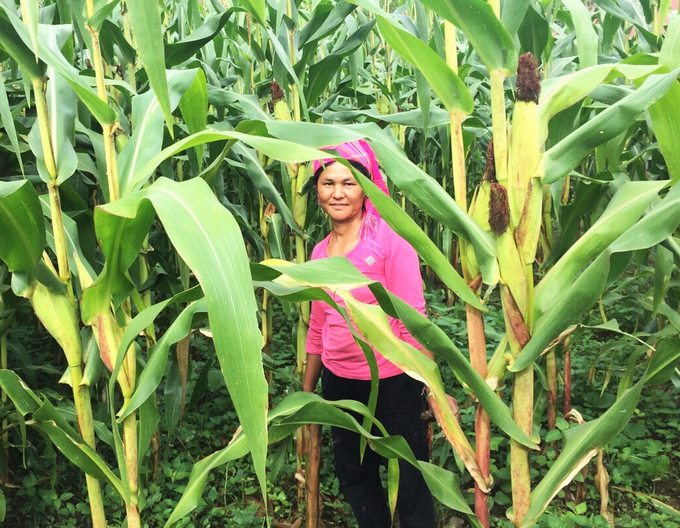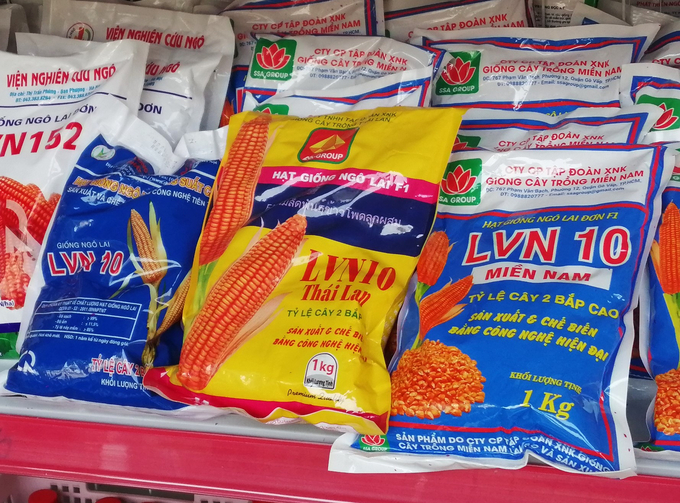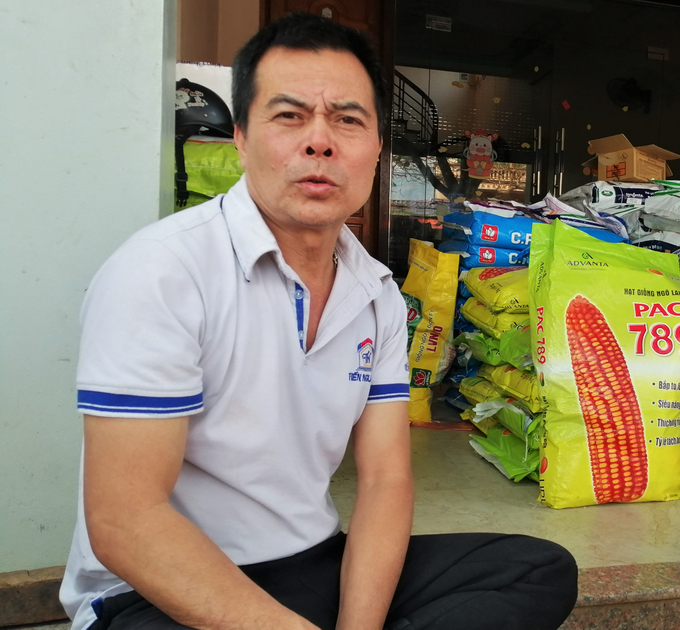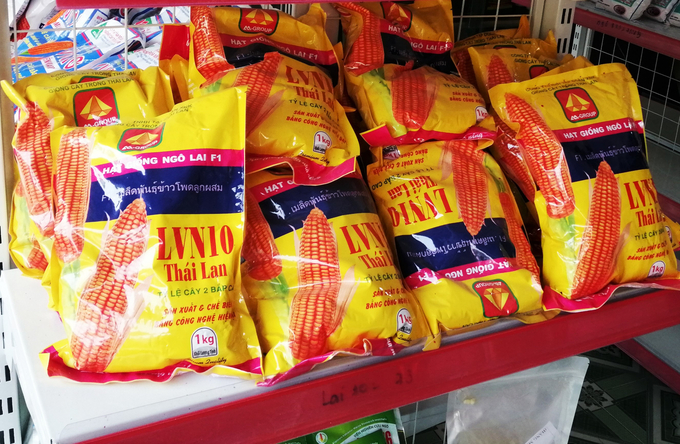Disregard of the provisions of the Cultivation Act
According to the Cultivation Act (valid from January 1, 2020), Acknowledging the reuse of a plant variety shows that the variety belongs to the originator or to a specific originating organization or agency. Many views believe that before the birth of the Intellectual Property Law (2005) it was not possible to return it to the “owner” is also a good thing.
Currently, many authors and author agencies have re-accredited and re-circulated the varieties they previously created. According to Article 22 of the Plant Breeding Act, the entities that want to continue producing and marketing this variety after the originator or originator agency has renewed the recognition of the variety’s traffic must obtain the approval of the originator breeder agency. In fact, however, some entities that implement this are still superficial, even ignorant, causing a lot of frustration and damaging the author’s and breed agency’s reputation.

The LVN10 corn variety was selected and bred by the Maize Research Institute, recognized by the Department of Crop Production (MARD) for recirculation pursuant to Decision No. 295/QD-TT-CLT of October 18, 2022. Picture: tsp.
Please give a concrete example of the production and business situation of Hybrid Maize LVN10 selected and prepared by Maize Research Institute (Vietnam Academy of Agricultural Sciences). This is a corn variety that has previously “stormed” the corn seed market and so far this variety is still competitive in the seed market.
LVN10 has been recognized as a Technically Advanced Variety (TBKT) since 1994 according to Decision No. 1058 NN-KHKT/QD of 26 August 1994 of the Ministry of Agriculture – Food Technology (now Ministry of Agriculture and Rural Development). When the Corn Research Institute put the variety into production, the institute did not protect it because there was no intellectual property law. Therefore, many units have exploited and used freely by keeping the parental lines and then producing and trading hybrid seeds themselves without a cooperation agreement or authorization from the author’s agency.
From the time the strain was allowed to go into production until 2005, when the Maize Research Institute established the state-owned One-member Co., Ltd. Founded Corn Consulting and Development Investment (in 2014 it was divested under the name Maize Consulting and investment in the development of corn), the LVN10 variety is only authorized by the institute to produce and trade this company until 2024 other companies any other legal or natural person .
In 2022, the corn variety LVN10 was authorized for circulation under the new provisions of the Cultivation Act by the Department of Crop Production (MARD) with Decision No. 295/QD-TT-CLT of October 18, 2022.
According to the Maize Research Institute, since the decision to extend the recognition of the recirculation of the LVN10 variety, the institute has sent a written copyright notice for the LVN10 variety to the provincial ministries of agriculture and rural development to coordinate inspection and management Physical.

At merchants in Dien Bien province, Son La sells “LVN10 corn” in many different units. Picture: Trung Quan.
A number of seed companies have also sent documents and negotiated to sign a contract authorizing the production and trade of LVN10 hybrid corn, such as Vietnam Seeds Corporation (Vinaseed), JSC Loc Troi Seed Joint Stock Company, Phu Nong Seed Co. , GmbH….
In reality, however, this variety of corn is still produced and sold on a large scale by many units and companies to agents without the consent of Maize Research Institute (author’s agency) according to the regulations, and they have not been approved by the local and relevant authorities for verification and Handling seen according to law.
Walking through the dealers, seed shops in the provinces of Dien Bien, Son La … it is not difficult to come across a number of “LVN10 corn” varieties produced by many units and companies with samples.The same Packaging code is sold publicly, but looking at it, the connoisseurs are easily “disturbed” because they don’t know what the real quality of LVN10 is.
Dealer owner Tien Van (Tuan Giao Town, Dien Bien) shared: At present, the store sells LVN10 corn from many entities such as Thailand Seed Import-Export Group Co., Ltd. at the same time. several other companies. The suppliers of LVN10 strains have known each other for many years, so if they offer goods, they import them for sale or send them promotional goods, but it is not clear who actually “owns” the strain.
“Big companies and small companies have both. The packaging of all types is similar, but qualitatively each unit advertises the same LVN10 as self-produced, committed to quality assurance. People choose varieties mainly based on habits, that is, once they get used to it, next time they will buy it again or see a well-known packaging called LVN10, but no one cares which unit produces, even some Families still ignore it, if you can bring it home and plant it, if they have food that can’t be eaten, they will crop it for the buffalo,” said agent owner Tien Van honestly.
Mr. Nam, a market clerk who sells corn varieties to a prestigious entity in Son La province, revealed to Dien Bien: As someone who works in the seed industry, no one knows LVN10 and the real “owner” His home is the Corn Research Institute. However, over the years the units have been freely exploited to the point that they still produce and sell the seeds themselves today. It is also because everyone gives themselves the right to produce, so there is such a “interference” of LVN10.

According to agent owner Tien Van (Tuan Giao City, Dien Bien), the units that come for sale to the agent all advertise “like LVN10” because they are self-produced and committed to quality assurance. Picture: Trung Quan.
Many first-level agents were initially just distributors for large corporations, then after finding that the LVN10 strain was selling well, they also registered to start a business, actually taking the name to print packaging and then extract the seeds. become his own. Gradually, since they had a good reputation, they also smuggled in poor quality seeds to make a profit.
“In the end, most small companies don’t have the capacity to produce seed, they just order a few producers of raw F1 seed, then put it in the company’s packaging and do business. Parent seeds from the above production units are not properly cared for and cared for, so genetic quality and seed standards cannot be verified. The production, processing and packaging of hybrid seed is not properly controlled, so we wonder where the quality is,” said Mr. Nam.
according to dr Vuong Huy Minh, deputy director of Maize Research Institute, domestic production of LVN10 hybrid corn is currently facing many difficulties due to weather influence, land, labor shortage and crop restructuring , in recent months, this corn variety has not had enough volume to hit the market supply.
So the question is, is the “LVN10 corn” varieties widely available on the market really quality assured, while the parent variety is maintained by the corn research institute, kept and never transferred to other units (if you want to produce), you must have a cooperation agreement and buy the institute’s parent breed, under the supervision of a control and testing body during the production process).
Unforeseen Consequences
Vuong Huy Minh, deputy director of the Maize Research Institute, in order to produce corn seeds in general and LVN10 in particular, it is necessary to meet very strict requirements, such as: Must a parent (corn) line have the best quality ( genetically correct and seed quality in terms of mechanical cleanliness, moisture, germination …). That is, the parent variety (parent lineage) of the hybrid corn variety must be granted by the copyright owner or copyright authority. The cloning process must be inspected and tested by designated testing and testing facilities.

Widespread production of LVN10 hybrid corn by many units without author’s permission will cause difficulties in seed management and seed quality management. Picture: Trung Quan.
Apart from that, it usually takes scientists 7-10 years or more to create a hybrid corn variety along with a lot of effort, funding and facilities (laboratory, proving ground, workshop, materials…).
The fact that the hybrid corn variety LVN10 is produced on a large scale by many units without the authorization of the author’s agency (no contract of transfer, no transfer, no purchase and sale of parent corn varieties…), the packaging itself with designing LVN10 too designate and to do so freely will cause difficulties in the variety management and quality management of the authorities; Violation of the Cultivation Act. Also, the parent strain is not nurtured using the correct method, resulting in an alteration in genetic purity, altering the nature of the strain and affecting yield and product quality.
In addition, the blunt production leads to unmanageable stages of cloning, hybrid seed production … Since then, it has been difficult to manage and solve problems that arise in the cultivation process.

